Are you looking for “A Dream within a Dream” analysis? Great. I love Edgar Allan Poe. “A Dream Within A Dream” is a brilliant poem. I’ll share my own impressions of this brilliant imaginative work of art. Let’s begin.
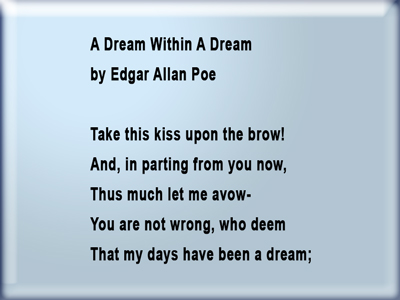
First, why a kiss on the brow? Is that just because of the time period? I mean, why not a kiss up on the hand or a kiss upon the lips. Clearly this is a parting kiss, but does the symbolism go deeper than that? What’s the analysis here? 🙂
Next comes the line about dreams. Note the wonderful ambiguity in the word, “dream”. It could easily be that the narrator merely wants to say, being with you is like being in a dream. That is, the word here would then take on a very positive meaning. But as we read on, we’ll see that this is not exactly case …
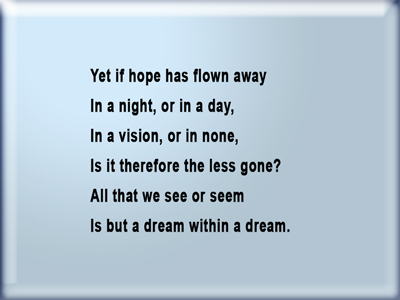
This is very enigmatic. Consider a different question, do ideas die? And how much of your soul is really just the ideas you have about the world? So even given there is a real world, that which you know about the real world is shaped by your own inner world, is it not? So even if the world were all dream-like, are not those dreams, themselves, real in at least some sense?
Consider this optical illusion:

Look at the blue lines. They are the same length – but do they look that way? Now if you form a memory of this picture, that memory will be of two yellow lines, each of different lengths. In one sense, that memory is false – reality was not really like that. However, that you have the memory and saw the world that way is quite real. So the memory is real!
So is not hope likewise real? There’s no easy answer here.
But now look at the line, “dream within a dream” … this phrase is potent with varying shades of different meanings. The narrator regards being with his lover as a wonderful dream, but is it not also an illusory happiness – and thus merely a dream? And perhaps if all life is but a dream, this is a dream within a dream. So you’ve got deep philosophical implications here being bandied about in wordplay, meter, and rhymes. Sure, my bit of analysis here could be off, but you have to admit this is utterly compelling and fantastic.
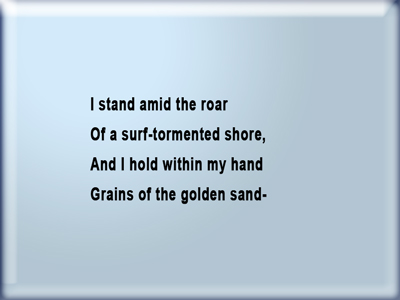
Whoa, we can get vertigo here, because we’ve totally shifted focus. We’re now no longer at a lover’s parting but at the ocean, holding a tiny grains of sand – such utterly bits of insignificance compared not only to the infinite sands of the beach, but the sea itself which stretches beyond the horizon.
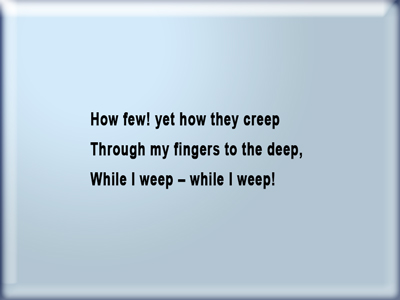
Clearly the narrator here is relating these grains of sand to something else. They are a metaphor revealing how trivial and insignificant that something is … but we don’t yet know what? Is this the hope that the narrator spoke of? Our memory of the dream within a dream?
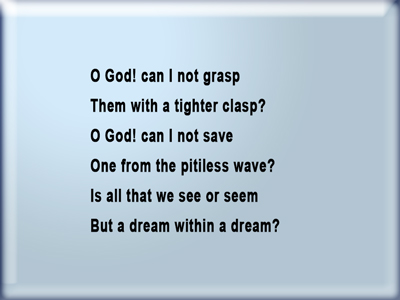
Consider, when you hold a grain of sand, you look at it, and it in some sense is different from the vast beach. You can look at it up close and see its own individual shape, maybe its color – almost like a snowflake, when held up close to you, that grain has a unique aspect to it. And in a very limited sense, you own that perception, it is yours and yours alone. But when you die, where does that perception go … does it even exist anymore? Or like the grain of sand fading into the infinite sands of the beach, does it just disappear?
So at first, the author cast a positive note here. Heck, yeah, maybe it is all a dream in a dream, but it’s my dream! Now the narrator faces a more difficult question, even if I can take joy in the fact that it’s my dream, are not even dreams mortal? Is not death still real?
This is an utterly brilliant poem. So gothic in its contemplation of death, it’s fear of death. Not only that but we have the mingling in here of romantic love and deep philosophical meanderings. You don’t have to agree with any of the possible implications of the poem in order to totally appreciate it’s brilliance!
Thank you for reading our “Dream within a Dream” analysis. We hope you found it helpful. Don’t forget to subscribe to our updates!